Church

The new CDC guidance has also prompted many pastors and faith leaders to revisit their own masking and social distancing guidelines for worship. But as an immunocompromised person, I want churches to know that if you choose to allow your congregation to unmask now, before we have any sort of herd immunity, you are asking immunocompromised people to choose between risking their lives or being excluded from church.
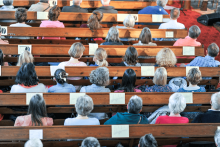
On Thursday, the Centers for Disease Control and Prevention (CDC) released updated guidelines telling people who have received the COVID-19 vaccine that they can now attend a full-capacity worship service and sing in an indoor chorus, among other activities.
While people “will still be required to wear a mask on planes, buses, trains, and other forms of public transportation” the CDC guidelines now say that if “you are fully vaccinated, you can resume activities that you did before the pandemic...without wearing a mask or physically distancing.”
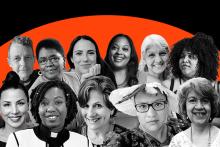
Collectively, this group envisions and works toward a wide and bold church community that cares for creation, centers those who the church has historically marginalized, and holds both political and faith leaders accountable.

Numbers like 500,000, hard as they are to grasp, are necessary for grieving.
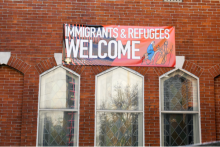
Members of Congress, led by Rep. Joaquin Castro (D-Tex.), wrote President Joe Biden a letter asking him to ensure those taking sanctuary in houses of worship would be protected from deportation. They also asked the Biden-Harris administration to lift the deportation orders against all people living in sanctuary.
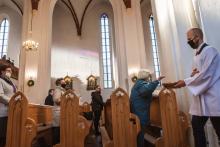
As churches create plans for re-opening their buildings and look toward a future where people have been vaccinated against COVID-19, there is an opportunity now to re-imagine church. Likely, it will never be the same. And maybe that’s for the better. Singing, hugging, and sharing food have become risky activities. I still grieve this, and yet the possibilities and imagination spurred by these limits excite me.
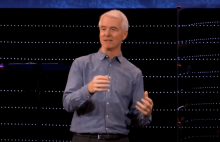
Menlo Church pastor John Ortberg Jr. knew his son was attracted to children and failed to restrict his access.
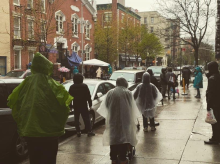
Much has been written about the ways in which the pandemic is exposing the fragility of our communities and the underlying vulnerabilities that were ignored. Over the years, Father’s Heart has tried to do what it can to knit the fraying margins of the neighborhood back into the whole, by reminding people of their God-given dignity and worth. But they are working against decades-long policies that have kept so many New Yorkers from accessing affordable housing and better paying jobs.

Samuel Cruz didn't want to choose between faith and politics. Then he found liberation theology.

Churches across the country are learning that loving one another and our neighbors — while physically distancing ourselves from them — is possible.
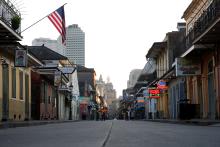
Jubilee is appearing all around us amid the coronavirus pandemic.

Between 1347 and 1352, 'The Great Mortality' touched a third of Europe's population.

Do pastors have any unique responsibilities in the midst of an outbreak?

Why split public and societal critique from personal care and comfort? Whose ends does this split serve?
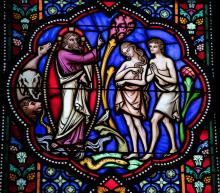
R&B singer Fantasia recently advised women to "let your man lead the way."
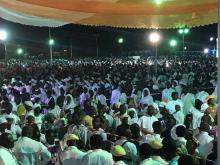
One year ago this week, I walked into the Cathedral in Santiago de Compostela, Spain, completing my pilgrimage there. This week I witnessed a different pilgrimage as about 100,000 people made their way to Mount Tabieorar, in Ogere Remo, Nigeria. They clothed themselves with white robes, took off their shoes, danced, sang, and prayed through the night and into the early morning with uninhibited joy. This was the 83rd time the Tabieorar celebration has gathered in this holy space.
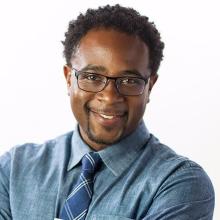
White evangelical support for Donald Trump has led some black evangelicals to a crisis of faith and ecclesial identification. In this moment, Jemar Tisby has risen as a voice that’s unafraid to challenge white evangelicals’ complicity with racism, forging another path for those feeling alienated. Tisby is currently completing his PhD in history at the University of Mississippi. He is the president of The Witness: A Black Christian Collective, previously known as the Reformed African American Network, and writes widely about racism, the American church, and social justice. In 2017, a New York Times article quoted him saying: “Racism is not a ‘blind spot’ within white evangelicalism. It is part of that tradition’s DNA.” Now, Tisby has published a book tracing that DNA by way of history.
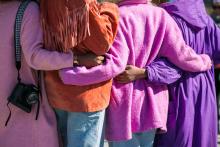
As I watch these dynamic leaders suffer for their brilliance and their courage — as I watch you suffer for your calling to ministry — I have to point out that this is not a story about individual women. It's not only about me or about you. We are confronting a cancer of bias, a perhaps at times unconscious reaction to #MeToo and Trump's presidency and female gains in graduate school and income and costs of childcare and impossible parenting standards and devaluation of teachers and an impossibly toxic yet superficial social media environment.

Speaking and preaching will only take a congregation so far. Real and sustained progress requires a change in cultures that demand people hide a part of who they are. “We must become congregations in which people are welcome to be their whole selves,” Snell writes. “When we do the work of making our congregations welcoming to those with mental illness, we can live into a vision of the fullness of the body of Christ, accompanying all and excluding none.”
